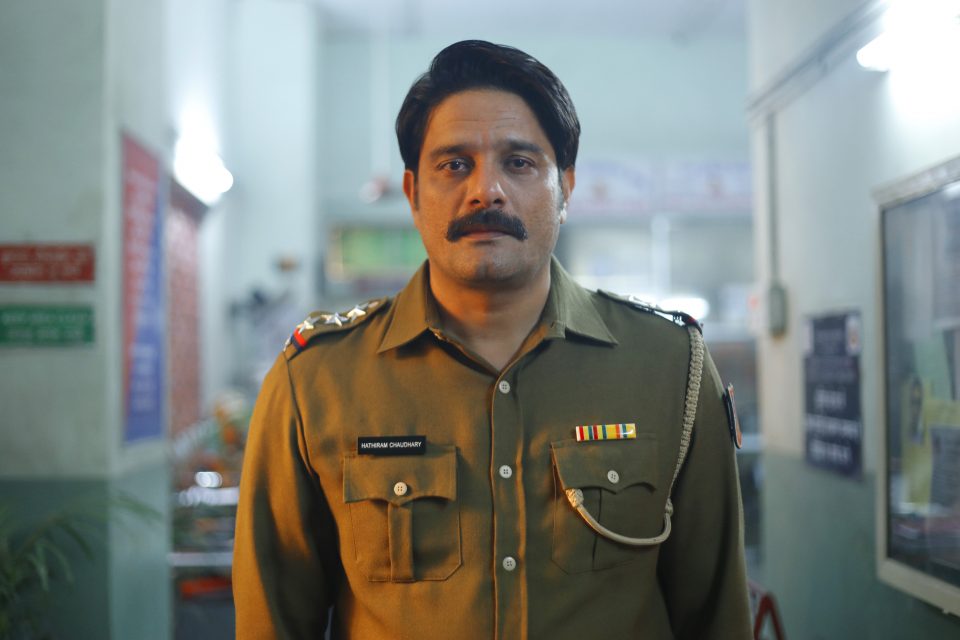Inside the Chaos and Control of ‘Paatal Lok’
The cast and crew of the breakout series discuss philosophy, power play and why love is all we need
New Delhi: Inspector Hathi Ram Chaudhary (Jaideep Ahlawat) patrols the Capital’s roads by night with rookie Imran Ansari (Ishwak Singh). Asphalt blurs as the siren’s red, blue and white blaze bounces off the tarp of the PCR van, immersing the nondescript vehicle and its khaki-clad officers in an otherworldly light. As Chaudhary explains, their plane is not entirely grounded, forming a bridge between worlds; three to be precise.
Scripture splits the universe into ascending realms. The bottom rung is called paatal lok (hell) where the insects or the lower class fester, the middle tier comprises the dharti lok (earth) where the humans of the middle class toil and the supreme level is ordained the swarg lok (heaven) where the gods or the upper-class rule over the three kingdoms.
“Waise toh yeh shastron mein likha hua hai par maine WhatsApp pe padha tha (You’ll find these words in scriptures but I read these lines on WhatsApp,)” Chaudhary closes with a wry smile.

Jaideep Ahlawat as Hathi Ram Chaudhary and Ishwak Singh as Imran Ansari in ‘Paatal Lok.’ Photo: Amazon Prime Video
It’s this tongue-in-cheek anecdote by which Sudip Sharma, creator and writer of Prime Video’s crime thriller Paatal Lok, wants to introduce viewers to the world of the breakout series. “There’s been this sudden explosion of mythology after social media and WhatsApp came into being. While history connects us to our real past, mythology connects us to what we believe was our past; anything is being shoved down our throats in the name of mythology,” he says.
Employing myth in the series was the makers’ way of saying that over millennia, nothing has truly changed. That ancient, oppressive structures of power still dictate how the world works and by extension, how we view those who operate within its folds.

A still from ‘Paatal Lok.’
Loosely inspired by journalist Tarun Tejpal’s (who, while out on bail, faces the charge of sexual assault) 2010 novel The Story of My Assasins, the nine-episode series follows beaten-down dharti lok cop Hathi Ram Chaudhary, who after 15 quotidian years of service in the Delhi Police, lands the quagmire case of a lifetime. When four suspects from paatal lok are arrested for the attempted assassination of a noted swarg lok journalist, Chaudhary finds himself unraveling the well-oiled machinations of the system that birthed them all.
“We’re holding up the mirror to the horrors in society”
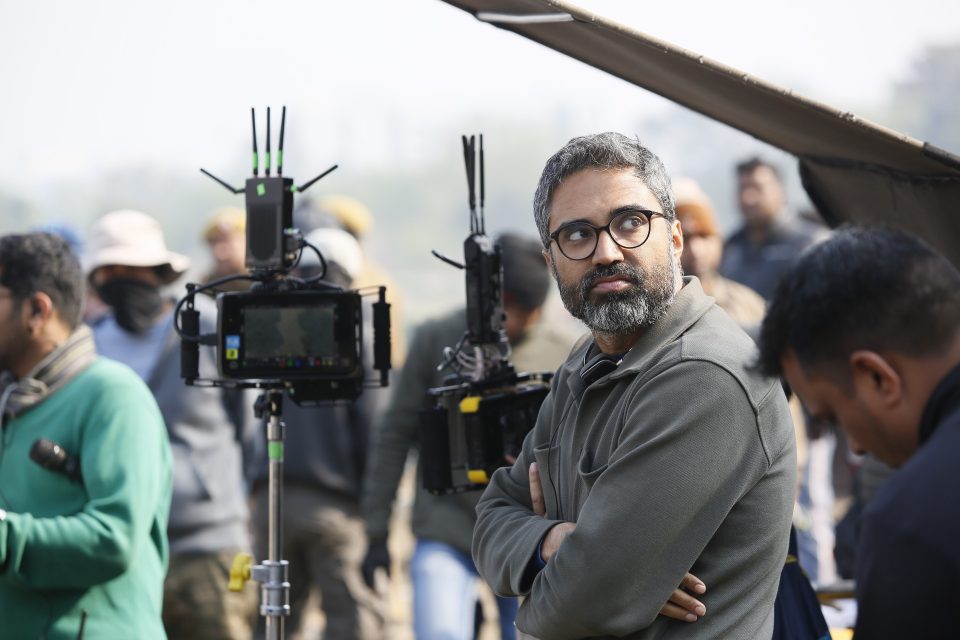
Sudip Sharma, the creator and writer of ‘Paatal Lok.’ Photo: Amazon Prime Video
Through Chaudhary, Sharma–and co-writers Gunjit Chopra, Sagar Haveli and Hardik Mehta–wanted to explore the various faultlines that while found in universal structures of power, manifest along infinitely intricate crevices in India. Delving into caste, class, crime, ethnicity, language, religion, gender, psychology and more, Paatal Lok sought to construct an image of the powder-keg times we live in. “These worlds sit uneasily next to each other and every once in a while, they collide and then there is an explosion,” says Sharma who used the myth of the loks (worlds) as a simplified guidebook for the larger complexities at play.

A still from ‘Paatal Lok.’
The series unfolds and we see a Muslim boy lynched by a mob at a railway station, a transwoman beaten up in male custody, an upper-caste gang of armed villagers meting out vengeance to a lower caste family, security agencies orchestrating an attack to serve an election agenda. These scenes represent the fears most minorities in India harbor; gaslighted about when spoken, booked under sedition when protested. The worlds of Paatal Lok are then a metaphor for the reality we inhabit, where systemic violence rages on out of condonation, complicity and privilege.

Avinash Arun and Prosit Roy, the directors of ‘Paatal Lok.’ Photo: Amazon Prime Video
“We’re holding up the mirror to the horrors that have always existed in society,” says Prosit Roy who co-directed the series alongside Avinash Arun. Straying away from the smatterings of technicalities, Arun adopted the ‘less is more’ approach during filming. “I just wanted the audience to observe the world within,” he says. Having regarded humanity through a raw and unflinching lens before, Sharma (NH10), Roy (Pari) and Arun (Killa) wanted Paatal Lok to unfold through the eyes of its myriad characters for an inside-out perspective across worlds. “Paatal Lok is neither a treatise on caste nor does it have the depth of a well-made arthouse film. What we’ve tried to do is touch upon and represent (minority) issues and identities that are often brushed under the carpet, especially in popular entertainment,” says Sharma who further adds, “This is what I want to explore with my work. I want to be able to raise a few questions about the things that disturb me and the cruel and brutal things that happen in the world around us. In the end, making Paatal Lok was really about having empathy and trying to understand and speak about the times we live in.”
The people of ‘Paatal Lok’
The gangster
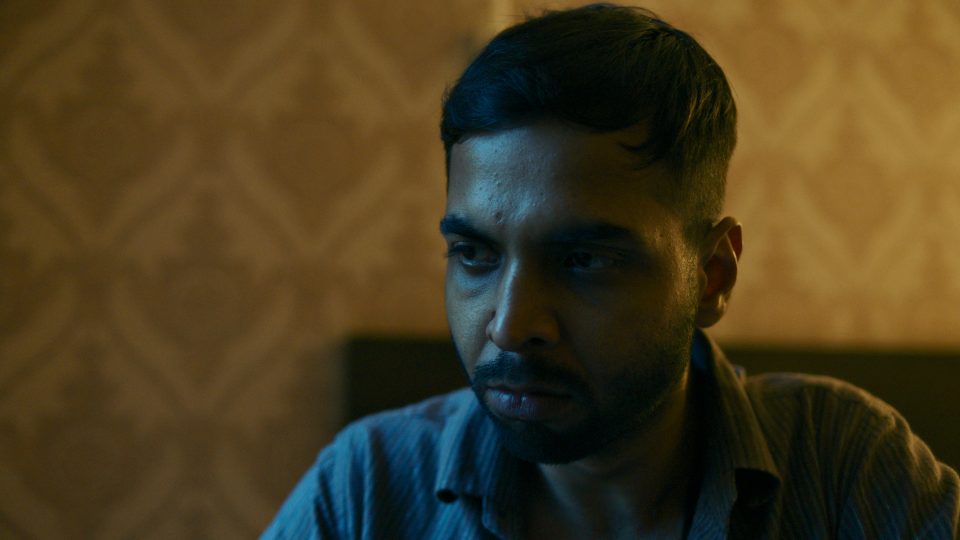
Abhishek Banerjee as Vishal (Hathoda) Tyagi in ‘Paatal Lok.’ Photo: Amazon Prime Video
Each world of the series has one character that forms the focal point of its chaos. In the underworld or paatal lok, that’s wanted murderer Vishal Tyagi urf Hathoda Tyagi played by Abhishek Banerjee. A consequence of Paatal Lok’s rigged chessboard, Tyagi forms his own code while playing by the rules and Banerjee can pinpoint the exact moment he slipped into the character’s skin. “During acting workshops for the role, I was locked in a room for 15 minutes. It was pitch dark and I couldn’t hear or see anything. That’s when I realized there’s so much we can’t see with our eyes open. That was the birth of Hathoda Tyagi for me,” he says.
“During acting workshops for the role, I was locked in a room for 15 minutes. It was pitch dark and I couldn’t hear or see anything.”
Banerjee views his character as a question to the jadedness of public consciousness; how people believe without questioning the details they’re presented with. The actor calls this cycle of information–the non-stop barrage of fake (WhatsApp) messages and unverified news stories–dangerous. “People get influenced by it while also expecting others to get influenced by it. It’s very important to question whether there’s any truth to what we’re being fed. Are people reporting or are people telling us stories for their own agendas?” he says. While not endorsing Tyagi’s violence, Banerjee hopes viewers understand that there are multiple sides to every story. “Look into how we all are interconnected in what occurs in society. How we are all a part of the system that both creates and hunts criminals,” he says.

Abhishek Banerjee as Vishal (Hathoda) Tyagi in ‘Paatal Lok.’ Photo: Amazon Prime Video
With Tyagi’s character, Banerjee’s goal was emptiness. He didn’t just want to perform the criminal, he wanted to tap into the state of mind that makes a man one. “There is a certain amount of freedom and dignity that every human being needs and expects, and somehow due to society’s norms, not every individual gets that equally, while some are altogether rejected. It was very important for me to understand how Vishal Tyagi reached a point where he would commit these gruesome crimes,” says Banerjee who was cognizant of not letting Tyagi translate on-screen as just yet another serial killer. Once Banerjee found oblivion and apathy, he also found Hathoda Tyagi.
The cop
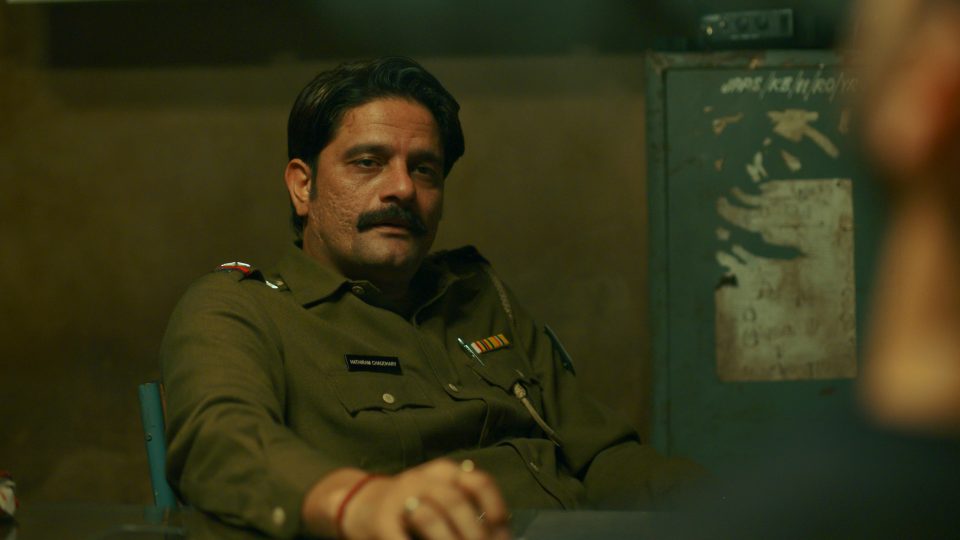
Jaideep Ahlawat as Hathi Ram Chaudhary in ‘Paatal Lok.’ Photo: Amazon Prime Video
Earth’s plane or the dharti lok is grounded by series protagonist Chaudhary who unwittingly finds himself as the bridge between worlds. Played by Jaideep Ahlawat, the inspector is the eye through which viewers navigate the storm. “I’m your medium and your path, because I’m in the same situation as you,” says the actor. Accountable and vulnerable to all, Chaudhary forms the perfect scapegoat in the investigation and the actor found beauty in portraying the underdog out on a limb. “He has this thing inside him ki agar maine yeh nahi kiya toh yeh log mujhe barbaad kar denge, main kahi ka nahi rahunga. Toh woh iss situation se jis tarah se baahar nikal ke aata hai, jis tarah se woh sabko handle karta hai (He believes that if he doesn’t do what’s demanded of him, the people in power will destroy him, he’ll be left with nothing. It’s how he comes out of this situation, how he handles what’s dealt to him)… He never steps back from the difficulties he faces,” says Ahlawat.
“Woh sher ban jata hai. Ki (He becomes the lion. He’s like) now I know your game and I’m not responsible to you.”
New clues crop up and culprits are revealed; the investigation itself turns into a masquerade of power players pushing their puppets to the brink. Chaudhary chomps on the bait and jumps into all-new territory. The first order of business, after all, is survival. “Desh mein sabse zyada woh aadmi shikaar banta hai jiske paas khone ke liye kuch ho. Jiske paas khone ke liye kuch hai hi nahi aur jiske paas sab kuch hai, woh aapka pawn kyon banega? (The biggest pawn in a nation is the man who has something to lose. The one who has nothing and the man who has everything–why would they be easily manipulated?)” poses Ahlawat.

Jaideep Ahlawat as Hathi Ram Chaudhary in ‘Paatal Lok.’ Photo: Amazon Prime Video
Driven by the chance to prove himself, Chaudhary’s triumph lies in how he unwittingly turns resistant to an order that has trained him to be otherwise. Learning on-the-go, the cop sifts through information whispered, recorded and gleaned, investigating a case only to chance upon a conspiracy. A variable programmed to be flushed out of the system, he then turns mediator between worlds. “Woh sher ban jata hai. Ki (He becomes the lion. He’s like) now I know your game and I’m not responsible to you,” says Ahlawat.
The journalist
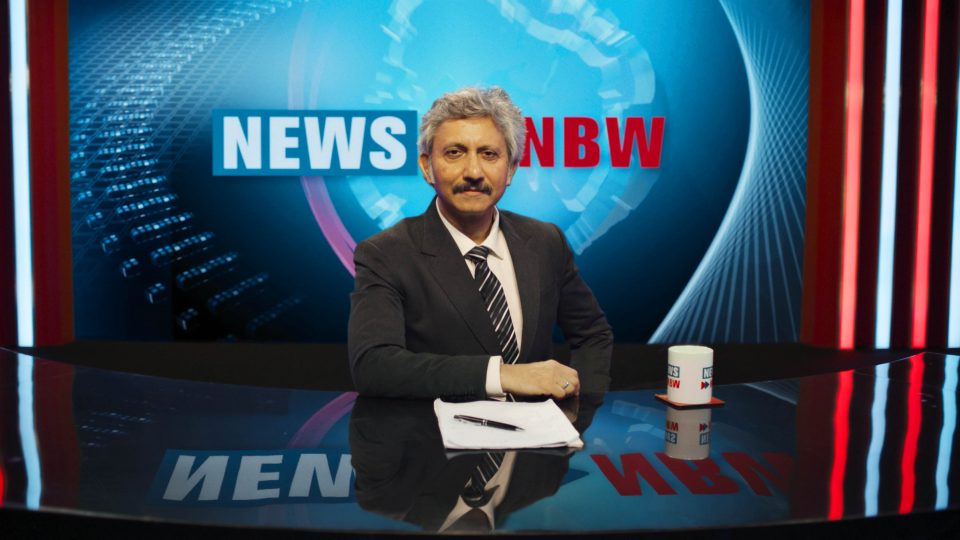
Neeraj Kabi as Sanjeev Mehra in ‘Paatal Lok.’ Photo: Amazon Prime Video
At the apex of the witch hunt is heaven or swarg lok’s Sanjeev Mehra played by Neeraj Kabi. The journalist, who is first introduced as the rattled target of an assassination attempt, soon snowballs into a contentious figure of expository spectacle. “This role was very interesting because it demanded two extreme shades of performance, each carrying into each other at all times,” says Kabi. Mehra represents both the control and chaos of the three worlds and the actor aimed to strike a delicate balance between how those facets translated into the journalist’s personal as well as professional life. “I read the script multiple times to understand how my character co-exists with the people in the Paatal Lok universe, being mindful of emoting according to the complexity and consequence at play,” he says.
“Nothing can be without the other. It’s diabolical… how the country survives and functions.”
Two sides of the same coin, the journalist is also the reason why Tyagi and Chaudhary find themselves questioning the rules of their callings. “Sanjeev Mehra, Hathi Ram Chaudhary and Hathoda Tyagi are all interconnected. They influence and jeopardize each others’ existence,” says Kabi about how the journalist, cop and gangster find themselves on the same uneven ground. With every special bulletin, Mehra influences public opinion while the politics that permeate the three lives create fissures in their ingrained beliefs. “Nothing can be without the other. It’s diabolical… how the country survives and functions. That’s why the series’ revelations are so shocking, it changes how you view the system now,” says Kabi.

Neeraj Kabi as Sanjeev Mehra in ‘Paatal Lok.’ Photo: Amazon Prime Video
Mehra’s pedigree ultimately lies in the creation of paatal lok; a world so separate and shunned from swarg lok yet the source of all its power. Kabi cannot envision heaven without acknowledging hell; refusing to see ghosts, criminals and devils minus the innate humanity they carry. “We think that they must be really tough, ki gainde ki charbi hogi inki–aisa nahi hai. Woh bhi humaari tarah-aapki tarah insaan hai, humaari tarah rote hai, haste hai, mehsoos karte hai cheezon ko, aur utna hi naram hote hai bacchon, biwi aur parivar ko lekar (that their skin is toughened–it’s not like that. They are human like the privileged. They laugh, cry and feel like the privileged and they’re equally as warm with their families as the privileged are,)” he says about having developed a sense of reinforced empathy after wrapping the series.
The actor wants people to look beyond the smokescreen when it comes to caste, class and crime. “Paatal Lok is about real people and the human condition. What do you do for a living when there’s no other way to make ends meet? If you look beyond the series and into the politics of our nation, most of these ideas… the murders and crimes are committed by the upper class. They don’t do it themselves, that’s why their clothes are neat and clean. We’ve to look at these factors before terming anyone as a criminal,” says Kabi.
A reckoning for the masses
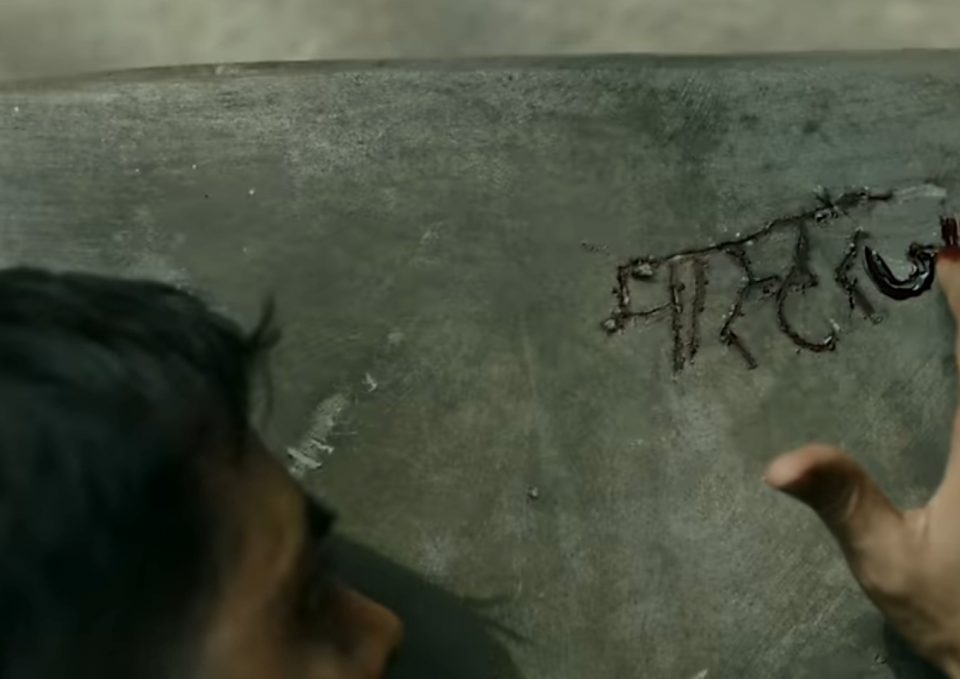
A still from ‘Paatal Lok.’
Paatal Lok is by no means an easy watch. It’s an unsettling portrait of modern India where there’s no respite from the constant and rampant misrule. At its worst, the series is an endless cycle of triggering visuals; at its best, it takes the country’s most contentious issues and turns an urgent spotlight on them.

Abhishek Banerjee as Vishal (Hathoda) Tyagi in ‘Paatal Lok.’ Photo: Amazon Prime Video
As Kabir’s “Sakal Hans Me Ram Biraje”–the hymn that encapsulates the philosophy of the show–plays over the final scene of the series, Sharma hopes viewers take away a message of solidarity from Paatal Lok. “We are basically trying to say that all you need is a little love. The bad has always been around and it’s possible things might never change, but a little love can see us through any evil,” he says.
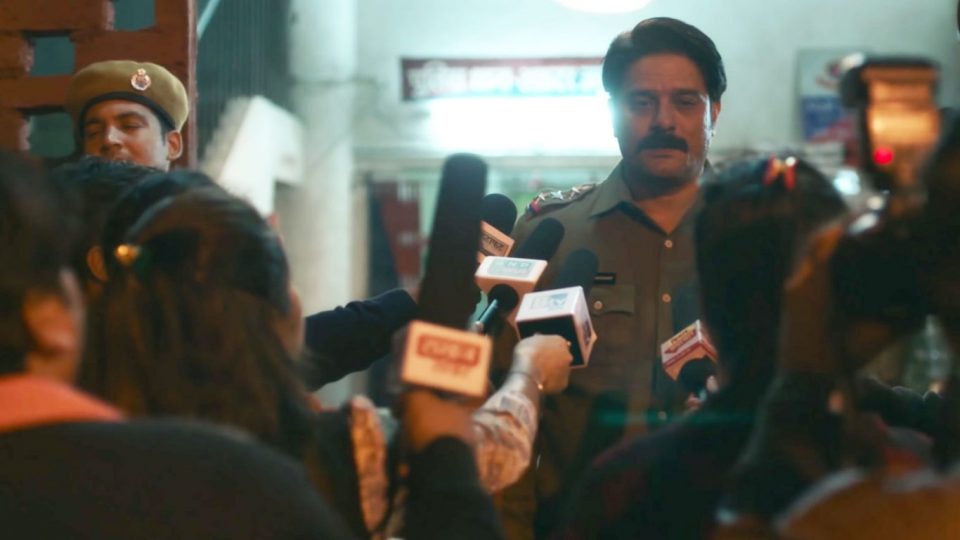
Jaideep Ahlawat as Hathi Ram Chaudhary in ‘Paatal Lok.’ Photo: Amazon Prime Video
As for Ahlawat, the man who plays the human being at the center of it all, he is ready to bid adieu to the worlds of Paatal Lok. “I have taken everything from Hathi (Ram Chaudhary) and I’m going to leave him to you (the viewers) now,” he says. The actor is haunted by his time as the cop and hopes this story lingers in public consciousness. “We have given everything to the audience. Now it’s their time to observe and take something away from it,” he says.



